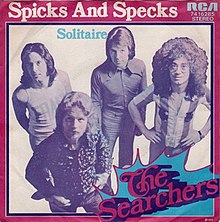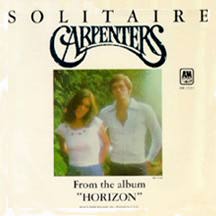Solitaire (Neil Sedaka song)
| "Solitaire" | |
|---|---|
| Song by Neil Sedaka | |
| from the album Solitaire/Neil Sedaka | |
| Released | 1972 |
| Recorded | June 1972 |
| Studio | Strawberry Studios, Stockport, England |
| Genre | Pop |
| Length | 5:02 |
| Label | RCA Victor |
| Songwriter(s) | Neil Sedaka, Phil Cody |
| Producer(s) | Neil Sedaka |
| "Solitaire" | ||||
|---|---|---|---|---|
 German single sleeve | ||||
| Single by The Searchers | ||||
| B-side | "Spicks and Specks" | |||
| Released | February 1973 | |||
| Label | RCA Victor | |||
| Songwriter(s) | Neil Sedaka, Phil Cody | |||
| Producer(s) | The Searchers | |||
| The Searchers singles chronology | ||||
| ||||
| "Solitaire" | ||||
|---|---|---|---|---|
 | ||||
| Single by Andy Williams | ||||
| from the album Solitaire | ||||
| B-side | "My Love" | |||
| Released | September 7, 1973 | |||
| Length | 4:22 | |||
| Label | Columbia | |||
| Songwriter(s) | Neil Sedaka, Phil Cody | |||
| Producer(s) | Richard Perry, Jack Gold | |||
| Andy Williams singles chronology | ||||
| ||||
| "Solitaire" | ||||
|---|---|---|---|---|
 US picture sleeve | ||||
| Single by Carpenters | ||||
| from the album Horizon | ||||
| B-side | "Love Me for What I Am" | |||
| Released | July 18, 1975 | |||
| Recorded | Late 1974 | |||
| Genre | Pop | |||
| Length | 4:40 | |||
| Label | A&M 1721 | |||
| Songwriter(s) | Neil Sedaka, Phil Cody | |||
| Producer(s) | Richard Carpenter | |||
| Carpenters singles chronology | ||||
| ||||
"Solitaire" is a ballad written by Neil Sedaka and Phil Cody. Cody employs playing the card game of solitaire as a metaphor for a man "who lost his love through his indifference"—"while life goes on around him everywhere he's playing solitaire". The song is perhaps best known via its rendition by Carpenters. Another version by Andy Williams reached number 4 in the UK Singles Chart in 1973.
Early versions
[edit]Sedaka originally was inspired by Frederic Chopin (his favorite classical composer) for the chorus and by Roberta Flack in the verses. When he presented the tune to Cody, he came up with the words based on his recent divorce; Cody had been playing solitaire frequently as a coping mechanism. Both Sedaka and Cody considered the composition to be a spiritual experience.[1]
Neil Sedaka recorded "Solitaire" as the title cut for a 1972 album recorded at Strawberry Studios, Stockport, England: 10cc members Lol Creme, Kevin Godley and Graham Gouldman accompanied Sedaka while Eric Stewart, also of 10cc, engineered the session.
Appearing on 1972 album releases by both Tony Christie and Petula Clark, "Solitaire" had its first evident single release in February 1973 as recorded by the Searchers; however it was an autumn 1973 single by Andy Williams which would reach number 4 in the UK Singles Chart and afford Williams a number 1 hit in South Africa.[2] The title cut from an album produced by Richard Perry, Williams' "Solitaire" also became a US Easy Listening hit at number 23. In 1974, Neil Sedaka's 1972 recording of "Solitaire" was included on his comeback album Sedaka's Back. Later in 1975, a live-in-concert version recorded by Sedaka at the Royal Festival Hall was issued as the B-side of "The Queen of 1964". This is the version of "Solitaire" that was released as part of Razor & Tie's 2007 Definitive Collection album.
Carpenters version
[edit]The Carpenters recorded "Solitaire" for the 1975 Horizon album; Richard Carpenter, familiar with the song via the versions by Neil Sedaka and Andy Williams, was "not crazy" about the song, but he felt it would showcase Karen Carpenter's vocal expertise. Despite assessing her vocal performance on "Solitaire" as "one of [her] greatest", Richard says that, "she never liked the song [and]...she never changed her opinion."[3]
"Solitaire" was issued as the third single from Horizon; for the single version a guitar lead was added between the first verse and chorus. It hit number 17 on the Billboard Hot 100, their least successful single since "Bless the Beasts and Children" in 1971; it signaled a downturn in the group's popularity which, consolidated by the Top Ten shortfall of the lead single and title cut of the 1976 album A Kind of Hush, would prove irreversible. "Solitaire" did afford the Carpenters their twelfth of fifteen number 1 Easy Listening hits.
Personnel
[edit]- Karen Carpenter – lead and backing vocals
- Richard Carpenter – backing vocals, piano, Fender Rhodes electric piano, Hammond organ, orchestration
- Joe Osborn – bass
- Tony Peluso – guitar
- Jim Gordon – drums
- Earle Dumler – oboe
Chart performance
[edit]Weekly charts
[edit]- Andy Williams
|
Year-end charts[edit]
|
- The Carpenters
|
|
Other notable cover versions
[edit]- Clay Aiken (US #4, Canada #1, 2004)
- Tony Christie
- Jann Arden
- Iveta Bartošová ("Solitér" Czech)
- Shirley Bassey – from her album All by Myself (1982)
- Beat Crusaders
- Sheryl Crow
- Vic Damone - from his album Now and Forever (1982).
- Gallon Drunk
- Johnny Goudie
- Sissel Kyrkjebø
- Johnny Mathis - included on his album Feelings (1975)
- Joe McElderry
- Nana Mouskouri
- Jane Olivor
- Patricia Paay (Netherlands number 24) 1983
- Elvis Presley - included on his album From Elvis Presley Boulevard, Memphis, Tennessee (1976)
- Brett Smiley
- Westlife
- Roger Whittaker
- Mark Lanegan on his 2013 album Imitations
- Josh Groban
Different version of the lyrics
[edit]There are significant differences between the lyrics in the Neil Sedaka, Andy Williams and Carpenters versions. Williams makes the lyrics personal, perhaps reflecting his then current separation from his wife, while the Carpenters take some of the Andy Williams changes but elsewhere keep Phil Cody's original lyrics.[citation needed]
See also
[edit]References
[edit]- ^ Archived at Ghostarchive and the Wayback Machine: "Today's Mini-Concert - 9/8/2020". YouTube.
- ^ "SA Charts 1965–March 1989". Rock.co.za. Retrieved September 5, 2018.
- ^ John Tobler. The Complete Guide to the Music of the Carpenters (1997); Omnibus Press, London; ISBN 0-7119-6312-6; p. 66
- ^ "Item Display - RPM - Library and Archives Canada". Collectionscanada.gc.ca. January 12, 1974. Retrieved August 18, 2019.
- ^ "The Irish Charts – Search Results – Solitaire". Irish Singles Chart. Retrieved August 11, 2019.
- ^ Flavour of New Zealand, 4 May 1974
- ^ "SA Charts 1965–March 1989". April 12, 1974. Retrieved August 18, 2019.
- ^ "Official Charts Company". Retrieved August 11, 2019.
- ^ "Top 20 Hit Singles of 1974". Retrieved August 18, 2019.
- ^ "Top Selling Singles for 1974". Music Week. London, England: Spotlight Publications: 20. January 4, 1975.
- ^ "Item Display - RPM - Library and Archives Canada". Collectionscanada.gc.ca. September 13, 1975. Retrieved February 18, 2019.
- ^ "Adult Contemporary Music Chart". Billboard. September 6, 1975. Retrieved October 8, 2016.
- ^ "Cash Box Top 100 9/20/75". Tropicalglen.com. September 20, 1975. Archived from the original on June 20, 2015. Retrieved October 8, 2016.
- ^ "Image : RPM Weekly - Library and Archives Canada". Bac-lac.gc.ca. July 17, 2013. Retrieved October 8, 2016.
- ^ Top 50 Adult Contemporary Hits of 1975
